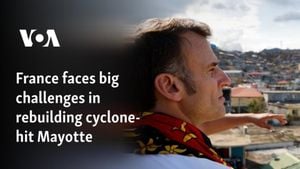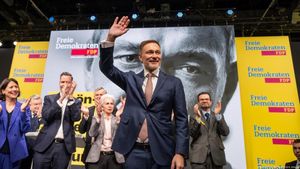Pope Francis's health has taken a serious turn, according to recent reports from Vatican sources. The 88-year-old pontiff, who has been staying at the Gemelli Hospital in Rome since February 14, is being treated for pneumonia, with his condition described as both "serious" and "critical" by Italian media citing the Vatican press office.
On Sunday evening, the Vatican confirmed, "The Holy Father's condition remains serious, but he has not suffered any additional respiratory crises since Saturday evening." This follows troubling reports of the pope experiencing significant breathing difficulties reminiscent of an asthma attack earlier last week. Blood tests indicated anemia, prompting the administration of two units of red blood cells.
Despite these challenges, the Vatican reassured the public there was no immediate danger to his life. The latest communication outlined, "Some blood tests show initial, mild renal failure, which is under control," indicating the complexity of the Pope's clinical picture and the cautious approach to prognosis.
Pope Francis, who has previously struggled with respiratory issues due to the partial lung removal he underwent as a young man, is currently receiving high-flow nasal oxygen therapy. His condition has led to the cancellation of public prayers, with the pope unable to lead the Angelus prayer for the second consecutive week.
On the previous day, the Vatican maintained the papal hospitalization was going smoothly, stating there were no disturbances during the night and the pope was resting. Cardinal Pietro Parolin, the Secretary of State for the Holy See, noted, "We are focusing on the Holy Father’s health, his recovery, and his return to the Vatican—these are the most important issues." This reflects the Vatican's emphasis on prioritizing Francis's health rather than engaging with speculations about his potential resignation, which have circulated amid his recent health challenges.
Further, Archbishop Vincenzo Paglia, president of the Pontifical Academy for Life, insisted there was no reason for speculation about resignation, affirming, "Francis will return to health, but he needs time." Cardinal Manuel Fernandez, the Prefect of the Congregation for the Doctrine of the Faith, echoed this sentiment, stating, "Such pressures for resignation are unfounded. A resignation must be completely voluntary to have any significance."
Meanwhile, as news of the pontiff's declining health spread, supporters have gathered outside the Gemelli Hospital, turning the area near the papal residence and modest hospital front entrance—while pilgrimage groups and faithful from various corners of Italy and beyond visit to express their solidarity and prayers for his recovery. Members of the youth group Militia Immaculata prayed by the statue of St. John Paul II, which stands before the hospital.
Heart-shaped balloons with messages of well-wishes filled with love and support have been left by visitors. Many of them offer prayers as they wait, emphasizing the outpouring of concern and faith from churchgoers worldwide.
The complications surrounding Pope Francis's health are particularly concerning not only because of his age but also due to his history with respiratory illnesses. His hospitalization earlier this month came after he experienced several days of breathing difficulties, which caused interruptions during public speeches.
Doctors initially diagnosed him with bilateral pneumonia, and his hospitalization is expected to extend for at least another week. Medical professionals continue to monitor his condition closely as they conduct various clinical tests.
While the Vatican provided updates, the Holy Father actively engaged with some aspects of his role, managing to partake in a Mass with staff who assist him during his hospitalization. Nonetheless, the overall prognosis remains cautious; the complexity of his clinical picture makes concrete predictions uncertain. "The complexity of the clinical picture and the necessary wait for the results of medication therapy mean no additional prognosis can be presented," the communiqué clarified.
On Sunday, attendees gathered for Mass at St. John Lateran Basilica, the Cathedral of Rome, where prayers were also said for the recovering Pope. Among them were individuals from various religious groups, service-dedicated hospitals, and the clergy, all reflecting the Vatican's commitment to collective prayer and healing.
Pope Francis addressed his health challenges earlier through personal reflections, expressing gratitude for the medical staff’s dedication at the Gemelli Clinic and affirming the importance of rest as part of his healing process. He is reminded of the now three-year anniversary marking Russia’s aggression against Ukraine, reiteratively encouraging prayers for peace across global conflicts.
“I extend my closeness to the suffering Ukrainian nation and urge you to think of the victims of all armed conflicts, praying for peace,” Pope Francis wrote recently.
Observers note how Francis manages to maintain his sense of humor and spirits amid adversity, which serves as a source of inspiration for many. The papal figure continues to remain engaged with his duties, albeit significantly affected by his recent health issues.
The situation remains fluid, and as the Vatican shares updates, the global community continues to rally support and prayers for Pope Francis, underscoring his significance within the Catholic Church and beyond.



